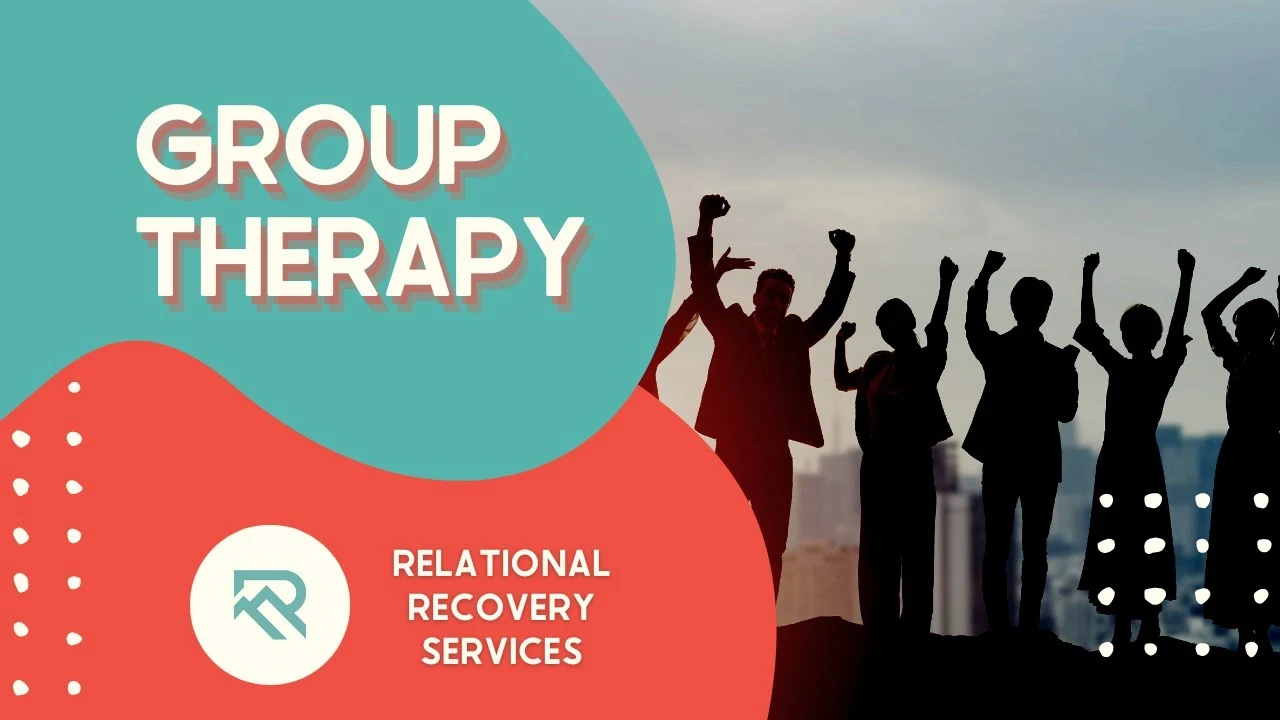Group Counseling
At Relational Recovery Services, we offer group counseling as a way to connect with others who are facing similar obstacles. By participating in this therapy, individuals will develop healthy communication skills and find comfort in knowing they are not alone.

Many individuals are wary of group therapy at first. It may seem intimidating to talk about your issues with a bunch of strangers. However, many individuals are pleasantly surprised by how much they enjoy group therapy and how much they benefit from it. Group therapy has become a standard technique in quality substance abuse treatment programs.
Research has shown that group therapy is just as successful as individual therapy for substance abuse and most co-occurring mental health issues. Relational Recovery Services provides group therapy as an important component for those who might benefit from this therapeutic group activity.

What is Group Counseling?
A group therapy session is a gathering of people who meet regularly, usually once a week, under the leadership of a trained counselor in order to address a wide range of mental health issues. You may think that group therapy is solely for people with substance abuse issues, but it can be used to deal with virtually any mental health problem that individual therapy treats.
Groups are led by one or two counselors and consist of between five and 15 participants who meet weekly for an hour or two. Groups are geared towards addressing a wide range of issues, such as depression, anxiety, substance abuse, and weight problems, in addition to anger and low self-esteem. Individuals who have all experienced the same loss or divorce, for example, are invited to join groups. Groups may last for months or years. If a group is open, anyone may join at any time, whereas a closed group will begin together.
Does Group Counseling Work?
Group therapy has proven to be very effective in not only addressing underlying issues but also in promoting the development of healthy communication and decision making skills. When people learn to interact with other group members freely, they often recreate the same problematic patterns of interaction that they experience outside of the group. Group therapy provides a safe environment in which they can experiment with alternative ways of treating themselves and others that may be more satisfying. It’s reassuring to know that other people have the same problems and can move past them, especially when you think you’re weird or strange because of your problems or the way you feel.
Benefits of Group Counseling
Group counseling offers a multitude of advantages, no matter what shape it takes. While patient-counselor relationships are responsible for individual therapy, the input of counselors and group support are both included in group therapy. The following are just some of the benefits of participating in group therapy:
- Sense of Community – Substance use and alcohol misuse frequently result in isolation from family, friends, and society as a whole. Substance use may also result in serious damage to these individuals’ relationships. Group therapy allows those with substance use or alcohol abuse problems to feel connected and included in a way that may be missing in their lives. When they see that they are not alone, that others can sympathize with their pain, and that healing and positive change are possible, they are less isolated, which allows them to heal and change.
- Support – The most significant advantage of group therapy is the chance for participants to assist one another and offer valuable knowledge and input based on their own struggles and experiences. Both the person giving support and the person receiving it benefit from this arrangement. Those who provide support feel empowered when they realize they have something worthwhile to offer others, as well as the pleasure of helping someone else. This leads to improved self-esteem, which is critical to maintaining sobriety.
- Improve Communication Skills – Therapy groups are excellent locations for members to share their experiences with one another and their group leader, thereby gaining new strategies for interacting. Therapy groups replicate everyday life outside of group and thus provide a realistic context for practicing new ways of relating to others, which often leads to the emergence of dysfunctional behaviors. Individuals can practice new relational strategies as well as form healthy new connections with other participants in therapy groups.
- Exposure to Different Perspectives – Rather than hearing only the counselor’s viewpoint, group therapy provides everyone with a variety of perspectives. This enables them to think about their issues in a variety of ways, including multiple perspectives on themselves or their situations. Having the ability to see a problem from numerous angles can help them enhance their problem-solving skills and let them understand and move on from previous perspectives that may have impeded their lives.
- Instills Hope for the Future – It can be devastating to live with either an alcohol or substance use disorder, leaving someone feeling lost and hopeless. Seeing others succeed in recovery while working on their own challenges is an effective method for lowering these barriers. Group therapy allows individuals to witness each other’s achievements and offer emotional support when things don’t go as planned. This provides a significant sense of hope that is important for the recovery process.
Is Group Counseling Right For Me?
Group therapy may not always be the most suitable choice for people with severe mental health problems or past life experiences. Trauma-related mental disorders may be treated better through individual therapy, and people with schizoid, borderline, and severe narcissistic personality difficulties may find a group setting challenging.
When selecting mental health treatment, it’s also important to take all treatment options into account. Group and individual therapy are frequently used together to deal with mental health issues. When group members discuss issues, they can discuss them in greater depth in individual therapy sessions, and insights from individual therapy can be applied in group settings. It’s crucial to understand what you’re getting into when selecting mental health care. A specialist with relational Recovery Services will be able to advise you on whether group therapy is correct for you.
Mindful Group Counseling at Relational Recovery
The goal of mindful group therapy is to help patients be present in the moment without judgment. Group therapy members are united in pursuing a common goal, thus forming a sense of fellowship and belonging. In a safe setting, sharing thoughts, feelings, and experiences with like-minded peers helps reduce emotional discomfort, guilt, and stress.
If you or a loved one would like to know more about group therapy or the many other services we offer, contact a specialist at Relational Recovery Services today. Our highly skilled counselors are here to make sure you have the tools needed to live a life free from addiction and mental distress. Our specialists are standing by and look forward to answering any questions you may have. We look forward to helping you.


